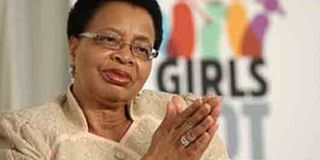Changing narrative on gender-based violence

Humanitarian effort: Graca Machel has been speaking up for girls’ rights. PHOTO I FILE
What you need to know:
They suffer in silence and resign themselves to a life filled with resentment and hopelessness. It reached a point where silence was perceived as a norm for a woman going through gender violence.
For years, African women have been subjected to infliction of gender violence which is oftentimes disregarded as mere domestic squabbles among couples.
They suffer in silence and resign themselves to a life filled with resentment and hopelessness. It reached a point where silence was perceived as a norm for a woman going through gender violence.
Josina Machel, a daughter of Glaca Machel and stepdaughter of the late South African former President Nelson Mandela took a brave step and told the world of her own domestic violence nightmare.
It was 17, October 2015, when the man she loved so much, beat her up to the point where she was left bleeding profusely and lost sight on one of her eyes.
“Since that day I’ve never regained sight on my right eye and I’ve been permanently scarred by the traumatic event,” she said, adding that she had never once thought that one day the man she loved so much would do that to her.
Josina decided that she was going to speak out; she doesn’t want women who go through such ordeals to suffer in silence. Through her NGO called ‘Kuhluka Movement’, she would continue to speak out.
There are many women survivors who have suffered harassment, gender-based violence but their voices are not heard because they present their issues to the wrong people.
“We need a platform where we can be heard and seen so that we can heel our wounds and become champions of others, encourage them to speak out, empowering our spirits without helping each other cannot make any difference,” she said.
She further said that through her NGO she encourages more women and victims to share their experience in order to change the narratives.
It is apparent that it is not just the victims of gender based violence who fail to justly convey information on the brutality of such violence, but media as well has at times failed to extensively provide detailed reporting on the violence that women are subjected to.
In a bid to change the perception on women and approach to reporting on cases of domestic violence and other forms of gender based abuses, last month, Tanzania hosted the United Nations Women capacity building training to fifteen African journalists across the continent on Gender Responsive Story Telling and Documenting Stories of success.
During the course of the program, fifteen journalists including myself had another privilege to be linked with a Women Advancing Africa Forum (WAA) “Driving Social Economic Transformation” launched by Tanzanian Vice-President Samia Suluhu Hassan.
Celebrating role of women
The new initiative was a Pan-African flagship Trust to acknowledge and celebrate the critical role women play and it brought more than 140 women across Africa and other developed countries to discuss several issues.
Issues discussed during the forum included; Mothers and Daughter Intergenerational Dialogue on the Changing Role of Women in Activism, women progress and the future however, I found an interest on Changing the Narrative, Media and Creative Industries and Unleashing Our Power for Social Change.
The two topics presented by different women brought tears to almost every woman who attended the WAA forum, because women amongst the panelists shared touching stories that shed light on the devastating state of affairs in as far as gender based violence is concerned. The stories were horrid but touching such that everyone who listened to them couldn’t hold back their tears.
“No woman should lose her dignity because she lost her husband, and no woman should keep quiet because of harassment,” these are some of the words that Schoolistca Kimarya and Josina Machel said during a panel discussion on “Unleashing our Power for Social Change”
“Where I come from, when you lose a husband, someone must succeed your husband by cleansing your body,” the Founder and Chief Executive Officer at Maadili Leadership Solutions and Self Mentor, Ms Schoolastica Kimarya said.
She said that most women in her country have been victims of Sexually Transmitted Diseases because of sexual cleansing, “we must say no to such inhuman and uncomfortable behavior,” she demanded.
The unspoken truth
According to her, women must speak for the unspoken truth, say no to make a change, “we must see change, sexual cleansing does not happen once but it happens more than twice therefore it is time to say no to cleansing,” she speaks.
Mr Abdul Mohamed, one of the attendees at the forum applauded the initiative started by Josina Machel which encourages women to speak out when faced with gender violence. “It is a great initiative because next time the culprits will think twice before abusing women for fear of being exposed,” he says, adding, “This is a positive move because victims of gender violence will not remain silent anymore.”
According to him, women often do not have the resources to find their way to the authorities to report incidences of domestic violence. When they do, they are often met with victim-blaming attitudes by those mandated to support them therefore it was time for women to say no to violence.
He said that in some cases they are even encouraged to remain silent, as what happens between a man and his wife is regarded as private.
The Former President of Pan African Parliament Dr Getrude Mongella said as Africa was moving to second liberation, media should portray strong voices of interesting women because in the first liberation media have portrayed women as victims.
“In developing countries, most of the time strong women have not been heard nor seen in the media but instead they have been portrayed in images,” she said.
She explained that to ensure that women were heard and seen, women themselves should partner with media and move together in the second liberation to claim their rightful place.
“Sometimes women deny giving the media information they want, this doesn’t work in our favour because failure to share information leads to concealment of facts,” she said. She explained that as Africa is taking a leap in to the second liberation and looking into the fact that liberation depends much on technology and partnership, the only way to deal with stereotype is through dialogue with women and the media.
UN Women Tanzania Representative Ms Hodan Addou said that African women are often depicted as victims, having little stake in control of their future, and with a limited role to play in the transformation and development of African nations.
“We need to change this narrative that relegates African women to a role of despondent individual, incapable of helping herself -- a one-dimensional personality that only focuses on fashion, food and romantic relationships,” she said.
According to her, studies have proven that the effective promotion of gender equality and women’s empowerment through role models and a positive narrative of the African woman not only contributes to the benefit of the women in terms of their individual capacities, but also contributes to the well-being and development of communities, countries and the continent as a whole.
For such initiatives to deliver worthwhile results, we need the support, contribution and commitment of the media through all its platforms.
The media is our key partner is ending gender-biased reporting on women and girls. Through your articles, programmes, photographs, radio shows and editorials, you shape the thoughts and beliefs of the people of your country.




